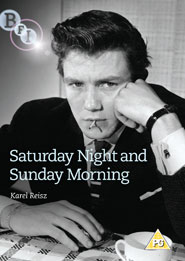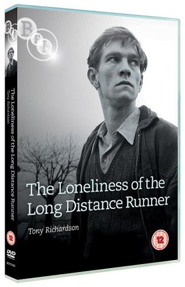
With the news that the BFI have just released the ‘definitive’ DVD (and Blu Ray) version of the films ‘Saturday Night and Sunday Morning’ and ‘Loneliness of the Long Distance Runner’ here’s an interview that Mark Hodkinson (of Pomona Books) did last year with the author of the stories that became said films, Alan Sillitoe.
I’m from Nottingham, same as Sillitoe, Mark’s from further up the road but he and I come from similar backgrounds of home and education. Though nowhere near as hard as Sillitoe’s upbringing, he was one of us. Reading ‘Loneliness of…’ at 12 had a profound effect on me, I could relate to it like nothing that I had read before. I know it did Mark the same way too. Getting the opportunity to meet the man was a big day for Mark and I will forever be grateful to him for the gift that he brought me back, a copy of ‘Saturday Night and Sunday Morning’ that he got the author to sign.
Mark has his second book coming out soon. Check here for information on that and the rest of the Pomona list. It’s good stuff. (JB)

The stock of the original Angry Young Men has never been lower. They no longer sell in any quantity, their books are largely omitted from school syllabuses and their status seems fixed as curios – a quick dip into a monochrome England of pubs, smoke and swagger.
The seminal novel of the period, Saturday Night and Sunday Morning, is 50 years old this month and its creator, Alan Sillitoe, has recently turned 80. ‘‘My trouble is that I think I’m 25,’’ he says in the North London flat he shares with his wife, the poet Ruth Fainlight. This is often said, of course, but you believe it of Sillitoe. He is still wearing the leather waistcoat, the well-polished worker’s boots and his inky, perplexed eyes flash brightly through the lines and grey.
Dutifully, Sillitoe is promoting a reprint of his classic novel but he cares little for its current status, sales or legacy for his revolution was completed long ago. While others have proselytised on the working class novel and its social and cultural impact, Sillitoe’s life force has been beloved and singular – writing, and lots of it. More than 50 books bear his name and across his study are more books-to-be, stabbed out on an electric typewriter and then covered in a rash of scribbling. ‘‘It’s something that comes from within you, the need to write. You’re born with it,’’ he says.
Most writers claim a remarkable journey but Sillitoe’s is truly extraordinary and a paean to self-belief and integrity. He was born into an impoverished Nottingham family who regularly moved house, their belongings piled on a handcart. His father, often unemployed, was a heavy drinker who routinely beat his mother. After a stint at the local Raleigh bike factory, Sillitoe enlisted in the RAF and was stationed in Malaya as a wireless operator. At 20 he contracted tuberculosis and spent a year in an RAF hospital where he read avidly and began to write. He was eventually pensioned off, which he still considers a piece of good fortune. ‘‘It gave me independence, receiving a cheque from the Queen every few weeks. The TB had been debilitating which meant I wasn’t much good for anything else apart from writing.’’
Along with Ruth, whom he had met in a bookshop, he headed to the sun and committed himself wholly to writing. He completed five or six novels in the early 1950s while living frugally in France, Italy and Spain, each of them unpublished. In Majorca they befriended Robert Graves who encouraged Sillitoe to focus on stories about his hometown. Inspired by an episode described in a letter to Sillitoe by his bother, Brian – about a young man ‘getting blindo’ in a pub and falling down a flight of stairs – he began The Adventures of Arthur Seaton while sitting under an orange tree in the autumn of 1956.
The book took 18 months to complete and was turned down by many publishers until Otto Strawson, a reader working for WH Allen, announced that it was ‘just about the best first novel I’ve read.’ Three years earlier Strawson had discovered Doris Lessing. Under the new title of Saturday Night and Sunday Morning, it was published in 1958 to critical acclaim and extensive sales. ‘‘I think all those years of writing before being published had taught me to write with precision,’’ he says. ‘‘I didn’t want to indulge in purple passages and overwrite and use too many words meaning the same thing and all the rest of it. I knew that the voice and tone was just right. I had found my own way, which is just as well.’’
By 1961 it had sold more than a million copies in the UK (it has now exceeded four million, world-wide), for which, in the Pan paperback edition, Sillitoe received a royalty rate of a penny per copy. ‘‘I remember at one point having £4,000 which was quite a whack in those days. I didn’t really give a toss about the money as long as I could go on writing.’’
Flinty and self-possessed, the book’s protagonist, Arthur Seaton, was further cemented in the nation’s consciousness through his masterful portrayal by Albert Finney in the film for which Sillitoe wrote the screenplay. Seaton was a composite of characters Sillitoe had known in Nottingham, including his brother Brian, a panel-beater. He had wanted to write of people and places he knew intimately. ‘‘I didn’t really know what the hell I was doing but I knew it wasn’t the usual stuff that people write about. I think I had objectified myself as an outsider at a very early age and channelled this into my writing.’’
Sillitoe was immediately grouped with other writers reporting back from the reality of post-war Britain, under the reductive catch-all: ‘Angry Young Men.’ His supposed literary comrades were, among others, John Osborne, Arnold Wesker, John Braine, David Storey, John Wain and Stan Barstow. In truth, he had scant contact with them. ‘‘Ninety per cent of readers are middle-class but my book went to a lot of working-class people,’’ he says. ‘‘I saw a copy of the book in a library once and it was battered and full of stickers because it had been borrowed so much. We didn’t really know one another because we were all busy with our own writing but I suppose we were kicking down doors.’’
While reviewers fixated on the anger, they missed the book’s other qualities – its pacing, energy, truthfulness and absorbing narrative. Arthur Seaton was the first literary celebration of fag-end charisma and how is coalesced with sexuality and savvy. He seldom felt sorry for himself and had a wise eye for the world. At one point, looking about him, he comments: ‘Nobody’s satisfied wi what they’ve got, if you ask me.’ He isn’t nihilistic either or ‘graceless, reprehensible, evil and ugly’ – as The Times had it in its review of 1958. In Arthur’s closing rally, delivered while in reflective mood fishing on the canal, he tells the reader: ‘Well, it’s a good life and a good world, all said and done, if you don’t weaken…’
A year after the book was published, Sillitoe repeated its success with The Loneliness of the Long Distance Runner. Subsequent books have sold far fewer but he has doggedly applied himself to his talent, averaging almost book a year since. ‘‘I’m pragmatic about the first two books. They got me going and have allowed me to write for all these years. As long as I’d had a roof over my head and food on the table, I would have carried on writing whether I was published or not.’’
On the first page of Saturday Night and Sunday Morning, Sillitoe refers to Saturday night being the ‘bingiest glad-time of the week.’ I remind him of this, pointing out the prescience of the word ‘binge’ and how it is now a staple of popular language. ‘‘Oh, words come in and out of usage all the time. I’m always thinking about them, especially those that come up in slang. Have you heard of ‘tranklements’? It means bits and bobs, your personal things, and they say it in Nottingham…’’
I was going to finish the interview by asking if he had any plans to retire from writing. I know the answer already.